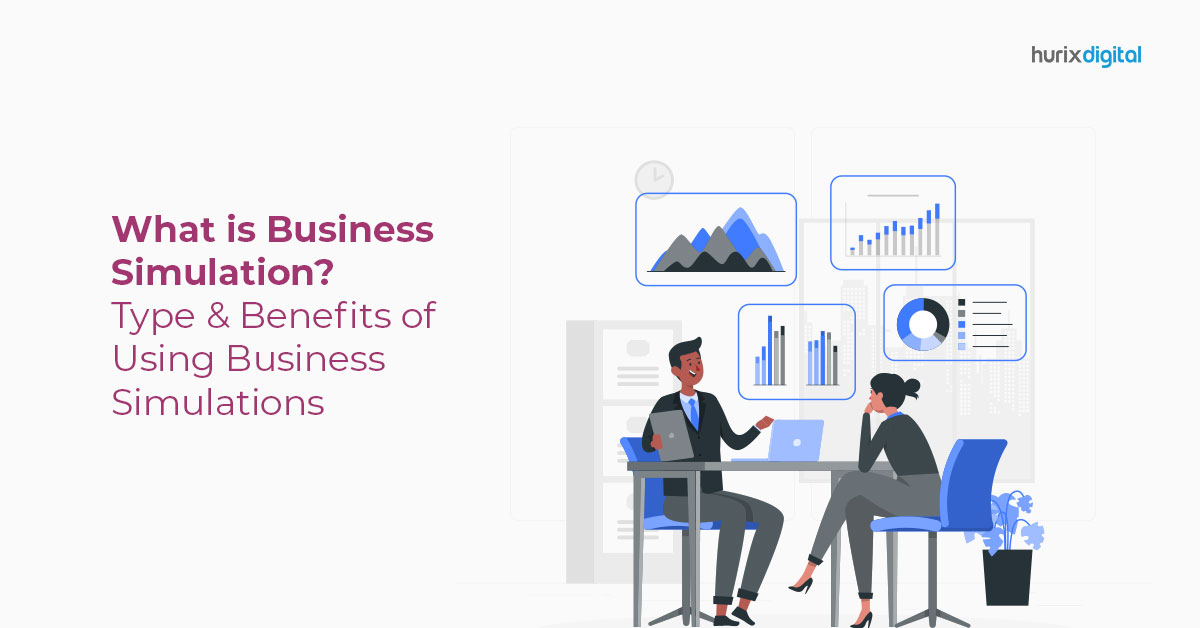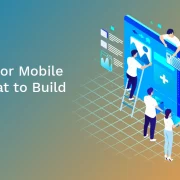
8 Innovative Business Simulation Techniques for Enterprises
The last few years have seen business simulation techniques becoming a widely used training method across industries. Enterprises now use them as a strategically valuable tool for corporate training and skill-building.
In a typical business simulation, learners must apply the concepts they have learned in a completely risk-free environment. Businesses use these simulations usually for developing skills such as business acumen, decision-making, problem-solving, and more. They have a fun and interactive element that keeps the learner interested in the learning process.
In this blog, we learn more about some of the innovative business simulation techniques enterprises can use.
Table of Contents:
- What are Business Simulations?
- What are the Different Types of Business Simulation Techniques?
- How to Get Started with Business Simulation Training in Your Organization?
- Conclusion
What are Business Simulations?
A business simulation is a powerful tool for creating highly interactive, engaging, and business-applicable scenarios in corporate training.
These simulations enable employees of an organization to align on strategy, improve their business acumen, and ultimately improve the company’s bottom line. To better engage learners, the best simulations are developed using the following principles:
- Thoughtfully scripted
- Based on reality and progressive levels of complexity
- Thoroughly evaluated and measured
- Used and debriefed in a safe environment
Simulations can be further customized to the competencies of employees and specific learning objectives of the organization. Simulations offer learners an engaging, educational, and rewarding experience based on realistic scenarios that teach them interpersonal and professional skills.
Also Read: How to create the best simulation training for your company
What are the Different Types of Business Simulation Techniques?
Here are 8 types of simulation techniques you must know about:
1. Process Simulations
Process simulations use mathematical techniques such as analysis of sales performance, statistical forecasting, and inventory planning.
This kind of simulation primarily deals with working with different types of data, finding patterns, discussing the various implications, and coming up with outcomes.
2. Monte Carlo/Risk Analysis Simulation
Monte Carlo simulation is a method of risk analysis. Businesses generally use this simulation before implementing a critical project or any change in a process.
It is built on mathematical models and uses the empirical data of the actual system’s inputs and outputs (e.g., production yield and supply intake). Once done, it then identifies the potential risks or uncertainties through probability distributions. This simulation can be implemented in various industries, including manufacturing, oil and gas, supply chain management, engineering, etc. Incorporating this type of training will help employees learn to identify risks and find appropriate solutions.
3. Predicting Outcomes
This simulation technique allows businesses to simulate (using spreadsheets) what might happen if certain conditions exist and generate more accurate forecasts.
Using this technique, enterprises can enable learners to use the existing data and manipulate it based on various potential changes or scenarios, such as winning new contracts or losing a major client.
For instance, learners can use prior sales data to predict future sales, followed by using Google Docs to create a scatter plot with a trend line to predict and understand the overall direction of the data.
4. Discrete Event Simulation
A discrete event simulation model enables enterprises to observe the specific events that lead to business processes.
For instance, in general, the technical support process involves the clients calling the business, the business system receiving and assigning the call, and the service representative or agent picking up the call.
Here enterprises can use a discrete event simulation model to help employees thoroughly understand and examine that technical support process. Discrete event simulation models allow learners to study various processes used in different industries (e.g., manufacturing, industrial, healthcare, banking, and more) and a diverse range of outcomes.
5. Concept Simulation
As the name indicates, this type of simulation emphasizes specific business concepts. For instance, operations of a factory unit or a new product launch are types of concept simulations.
They are generally pretty short and straightforward simulations that involve 2-3 decisions. The process involves learners entering their choices into the systems and receiving the results.
6. Strategic Simulation
Strategic simulations involve the various strategic management aspects of the business. These may either be spread over a course or be run in a single session. The decisions in strategic simulations mainly deal with marketing, finance, product design, and more. These simulations involve a group of learners interacting with each other.
7. Agent-Based Modeling and Simulation
An agent-based simulation is typically a model that understands and examines the impact of an agent on a specific business environment or system.
The agent here could be anything from people to equipment or anything else. The simulation primarily includes the agent’s behavior, which serves as rules or guidelines of how agents must behave in the system. Learners can then assess how the system responds to such rules.
8. Event Scheduling Simulation
The event-scheduling simulation method is the one that explicitly takes time as a variable. There are a vast majority of simulation programs that are based on an event-scheduling approach.
The reason for the popularity of the event scheduling simulation model stems from the robust computational efficiency of the technique. The resulting simulation models are usually quite obscure and also require sophisticated data structure.
How to Get Started with Business Simulation Training in Your Organization?
Implementing business simulations might seem complex, but with the right approach, it can be an exciting and transformative journey. Here’s a step-by-step guide on how to get started and some tips to maximize the impact on your employees.
1. Define Your Training Goals Clearly
- Identify Specific Learning Objectives: What are the skills or knowledge areas you want employees to focus on? Examples include critical thinking, financial acumen, and strategic decision-making.
- Align with Organizational Needs: If your organization faces rapid industry changes, consider simulations that encourage adaptability and resilience.
2. Select the Right Simulation Model
Different models suit different purposes. Choosing the right one ensures training relevance and depth. For example:
- For Risk Analysis: Monte Carlo simulations provide excellent insights for high-stakes projects.
- For Process Optimization: Discrete event simulations are ideal for understanding and refining workflows.
3. Use Real-World Data for Realistic Scenarios
Simulations are more effective when based on real organizational data, offering employees a realistic learning environment:
- Source Data Internally: Consider using historical sales figures or project data to mirror actual challenges.
- Incorporate Relevant Scenarios: Industry-specific simulations make the experience more engaging and impactful.
Studies indicate that employees retain up to 60% more information when training simulations incorporate real-world data rather than generic examples.
4. Start Small with Pilot Programs
- Run a Small Group Test: Choose a department or team and implement a short simulation to gauge effectiveness and identify any potential challenges.
- Gather Feedback: Survey participants to understand what worked well and where adjustments are needed. Pilot feedback can help refine your approach before a broader rollout.
5. Incorporate Feedback Loops and Debriefing Sessions
After each simulation session, a structured debrief allows participants to reflect, discuss, and connect lessons to their roles. Tips to enhance the debriefing:
- Encourage Open Dialogue: Allow learners to share their experiences and insights.
- Link Insights to Real Roles: A strong debrief makes the experience applicable, reinforcing that simulations aren’t just ‘training games’ but valuable learning experiences.
6. Track Metrics to Measure Success
- Quantify Learning Outcomes: Use assessments, feedback, and performance data to track skills gained.
- Assess Engagement: A well-received simulation usually has high engagement rates, which can be a proxy for long-term retention.
Conclusion
When implemented correctly into the training program, business simulation techniques serve as an innovative, cutting-edge way of enhancing learning retention and promoting collaboration between employees at all levels. If you are looking to develop the skills of your employees through active and practical learning, it is best to consider the various benefits that business simulations offer for organizations of all sizes.
Are you ready to elevate your corporate training with immersive, impactful simulations? Hurix Digital offers tailored, industry-leading solutions that bring real-world scenarios to your training programs, helping teams build essential skills seamlessly. Connect with our team to discover how simulation-based learning can transform your workforce.









